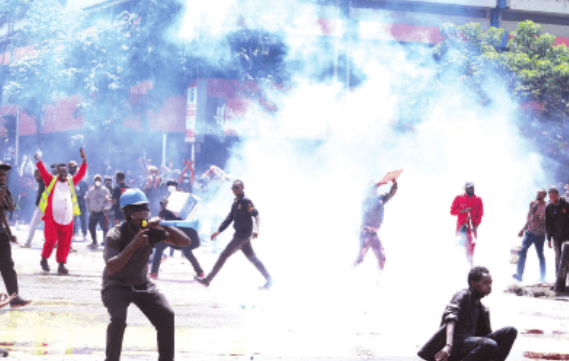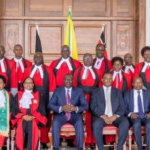With President William Ruto considering a government reorganization, attention has once more focused on the National Intelligence Service (NIS) led by director Noordin Haji.
Questions are being raised about whether the NIS, responsible for gathering and analyzing intelligence to advise on security threats, failed to anticipate the mounting dissatisfaction over the controversial Finance Bill 2024 that sparked protests.
Concerns within government suggest that if the youth had peacefully marched to State House instead of Parliament and staged a prolonged sit-in demanding the President’s resignation, it could have posed a significant challenge to his leadership.
“This was by all means a coup against the government. It is only by luck that the youth went to Parliament instead of State House. What would have happened had they marched there and refused to leave until the President resigned?” a senior security advisor said yesterday.
The National Intelligence Service (NIS) is facing scrutiny following the June 24, 2024 demonstrations that resulted in protesters storming parliament. Also under scrutiny is Inspector General of Police Japhept Koome, who is accused of inadequate security measures to protect parliament and allegations of excessive force by police officers against protesters.
According to reports, NIS allegedly did not fulfill its duty to inform the head of state about the situation on the ground before citizens took to the streets.
Last-minute decision
While terming the last-minute decision by President Ruto to recall the Bill ‘embarrassing’ to the Kenya Kwanza government, Gachagua claimed that if Haji had done his job well and ensured the president and his administration were well aware of the public’s position on the Bill, no one would have died.
“Ruto deserves better, he deserves a DG who knows what he is doing, who is effective and can analyse situations to keep the government informed,” said Gachagua.
The Deputy President, identifying himself as a man of truth, expressed his dismay, stating, “As Deputy President, it is embarrassing that protests, deaths, chaos, and damage were needed for the President to become aware of the truth, especially when there is an organization tasked with that responsibility.”
In contrast, on Wednesday, Defense Cabinet Secretary Aden Duale defended Haji, noting his long tenure as an intelligence officer since a young age. Duale emphasized Haji’s career advancement through the ranks before assuming the position of Director of Public Prosecutions.
“From an early age, Noordin Haji was a career intelligence officer, and rose to the position of Deputy Director. For you to rise to the position of deputy director in the NIS is highly coveted. Noordin Haji is one of the best DG the country can have,” Duale said on a JK Live TV interview.
He further stated: “Many will say the minister (Duale) is saying this because Noordin comes from his community and his county, that notwithstanding, Noordin Haji fits the bill.”
Supporters of Haji argue that he might have advised the President appropriately but failed to act upon it, a stance dismissed by critics who argue that if the information had been shared with other security agencies, the outcome might have been different.
Gachagua’s remarks sparked strong responses from elected leaders in North Eastern and some members of the Muslim clergy, who vehemently defended Haji. Despite this, there is mounting pressure from President Ruto’s allies to reassess the leadership and activities of the NIS.



